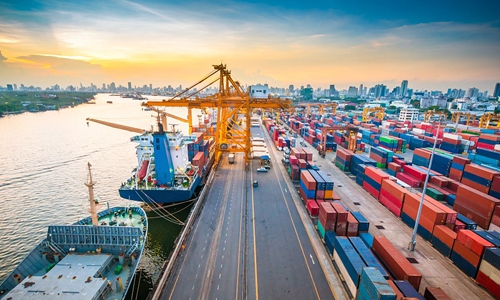Employment, not GDP, key in 'wartime' economy: Global Times editorial
Source:Global Times Published: 2020/4/17 20:42:59

Photo: VCG
China's economy contracted 6.8 percent in the first quarter of the year, unprecedented since the reform and opening-up. The figure did not surprise anyone, and reflects China's nationwide epidemic fight since late January. China's stock market also performed normally and closed higher after the official figure was released on Friday.The novel coronavirus epidemic is a disaster unseen in a century. It will rock the world and each economy will more or less experience a growth shock. The general trajectory of the Chinese economy will not be reshaped by the epidemic, which is a common understanding and reflects confidence.
It would be self-misleading if we focus our attention on specific statistics of GDP. China should focus on whether our society exercised the utmost forceful and reasonable efforts to wither the current storm, whether people supported the effective and efficient functioning of the anti-virus mechanism, whether China maintained the basic livelihood of its people, and whether the country's key sectors remained operational. The Chinese economy must be able to undertake these missions without being disrupted.
Looking back in the first quarter, we can see that the Chinese economy has well fulfilled these missions. After years of development, it has withstood the unprecedented test. In these key times, it has safeguarded the interests and livelihoods of the 1.4 billion Chinese people and enabled them to fight the virus.
The second quarter has already started. The Chinese economy is facing more complicated tasks and objectives. The ongoing virus fight still brings in uncertainties. Meanwhile, resumption of production and work will become new themes, while how to balance economic recovery and the virus fight needs to be explored. Moreover, the virus fight on the world stage will greatly affect the Chinese economy and it is not entirely up to China as to how far it can restore its economy.
In this quarter, China's primary task is employment. China should try to enable job opportunities of all the people, which will expand and adjust previous working principles and vitalize the work that was not carried out in normal times. For instance, improving cities' infrastructure will bring more jobs.
When the economy cannot function normally as in normal times, boosting employment as the main thread will best help ensure that limited resources and opportunities will be first used to maintain the interests of the people and consolidate the people-oriented economic pattern. From this point, we can walk toward full economic recovery.
Although official figures show that China's employment in the first quarter remained stable, it is a fact that the service sector did not fully recover. It is no doubt that the service sector and associated industries will face unemployment. All the areas across China need to explore ways to revitalize the service sector, which is the lifeline of securing employment.
China has performed best in the virus fight. From a long-term perspective, we must turn this achievement to boost the economy. Whether China can fully restore its economy while ensuring safety depends not only on the global pandemic situation but also on measures taken by Chinese cities. This is the real challenge to governance.
The death toll and economic recovery are the two most important criteria evaluating the effect of virus fight in each country. China has left Western countries far behind in terms of the first criterion, and it should perform the best in terms of the second. If so, the confidence of Chinese society will be sustained.
Posted in: EDITORIAL